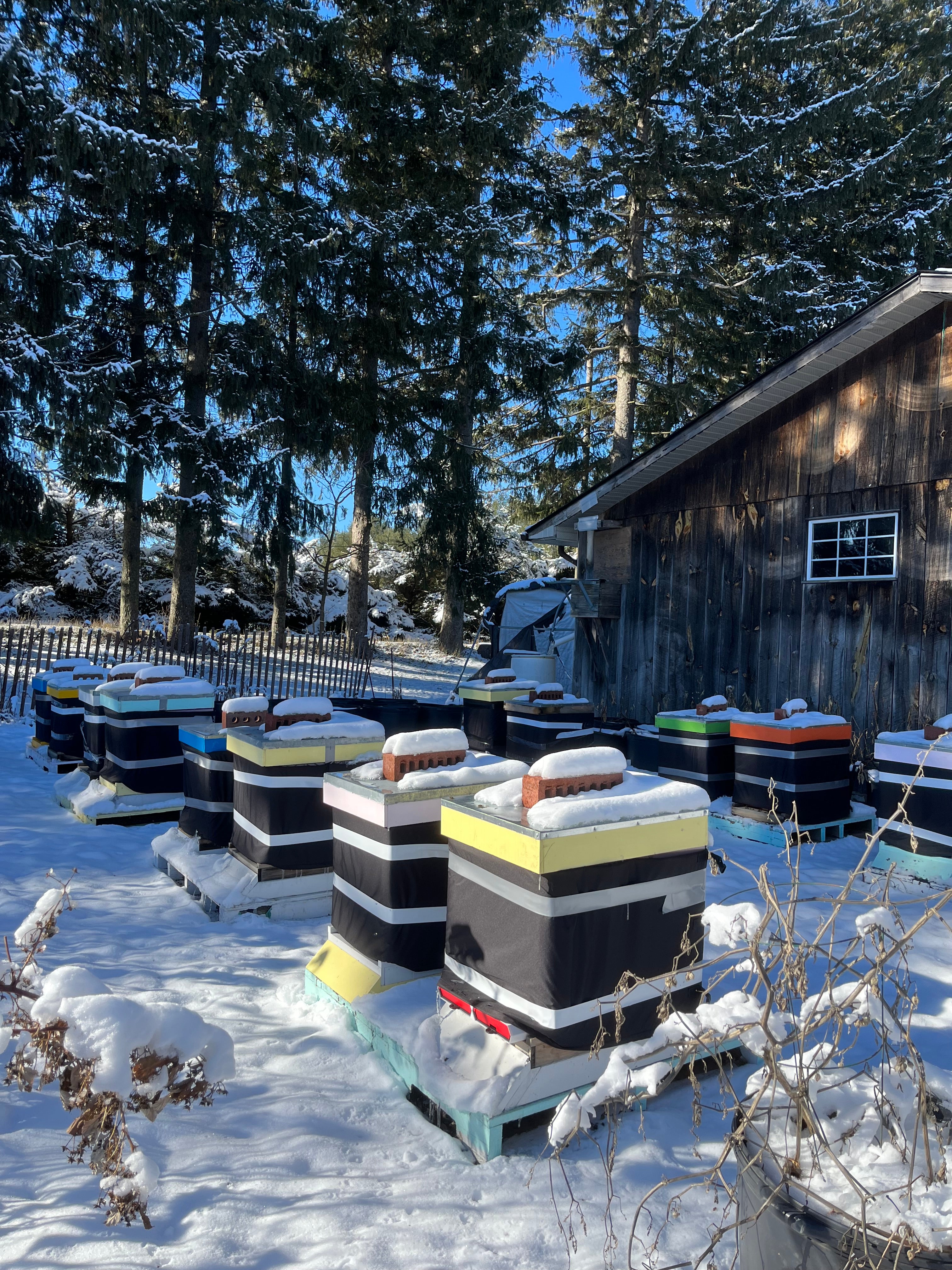
Go tell the bees
Written by Irene Kicak
Dedicated to E.A.B.

Amongst the many duties of a humble beekeeper is that of “telling the bees.” A longstanding tradition in many European countries, telling the bees involves visiting one’s apiary to bring news of important happenings in the beekeeper’s life, including deaths, births, and marriages. Historically, bees have been credited with supernatural powers; therefore, when a beekeeper fails to “tell the bees,” the hives may penalize their keeper by absconding, ceasing to produce honey, or even dying en masse.
I recently started the tradition of telling the bees in our own apiary. With the unusually warm weather we’ve had over the last couple of weeks, I decided to pay a visit to our apiary, observing closely for signs of life. On warm days in later winter, it is not unusual (and, in fact, it is quite a relief) to see activity near each hive’s entrance, as bees fly in and out to defecate and re-orient themselves with the sun. Some bees will leave the hive to look for water sources. Others remove bee corpses gathered near the entrances throughout the winter months. And amidst all this activity, the queen will continue to be fed, groomed, and protected. Matriarch of the colony, she is hardwired to start laying summer bees in a month or so. In due time, she will say goodbye to her winter daughters who have sustained her for six months, their familial obligation paid in full. The bees wait for signs of spring as do we. A waft of airborne pollen will signal to her majesty that the task of laying should begin. Healthy, fertile queens are capable of laying eggs almost constantly. During peak season, a quality queen can lay over 2,000 eggs per day - that is more than her own body weight in eggs in a day.
But we are ahead of ourselves here in southwestern Ontario, a mere three weeks into February, and grasped by a potent ice storm. Let the Queen Bee rest a few weeks more.
As Veronica and I check each colony on a rather gloriously warm February day, we take note of remaining stores of honey and add white sugar to hives that have devoured their winter rations. Without our timely intervention, the bees risk starvation before spring’s arrival. As beekeepers, it is our responsibility to deliver our hives safely out of winter’s clutch and into spring’s promise. As I approach each hive, I tell the colony of a few significant events in our lives.
With the hum of a hive before me, I reflect on my decades-long journey to maintain good mental health. Despite encountering some rocky paths along the way, I have grown a great deal in my adulthood, and especially now as I sit safely in mid-life. I tell the bees that in my fiftieth year, I am stepping back to seek clarity from the tangled knots that have become visible to me in the past year. I recognize, albeit slowly, that some paths in my life had to end so others could begin. And that things had to fall apart so that something new could come together. I tell my bees that we both, together, are in transition. As the bees are slowly coming out of winter hibernation to begin their pollinating roles, my own feelings of loss, confusion, anger, and abandonment will eventually be replaced with a more robust sense of self. I whisper to the bees: don’t confuse this time of transition as a forever state of being…or being broken. Rather, we are breaking away from what was, creating space for what will be.
The bees are slow to move, still enjoying their winter slumber. All of our colonies have survived for now. As we feed and tuck in the hives for six more weeks of winter, I am particularly drawn to these fascinating creatures with whom humanity has shared a sacred bond for millennia. They are one of Mother Nature’s wonders, and I have been fortunate to know them with such great intimacy. What started as a one-year beekeeping hobby course at the Toronto Botanical Gardens years ago has evolved into a deeply personal relationship with honeybees. Apiculture allows me to meld my pursuit of sustainable living with my profound respect for non-human living beings and the complexity of their lives. As a beekeeper, I am now aware of the intentional unity that guides every action in a bee colony. With this in mind, I too take a mindful step forward in my own personal healing journey. And with intention, I close the lid of each of the bee colonies, and whisper to them “Soon girls, soon we will be flourishing once again.”